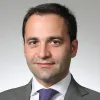Kalin Anev Janse in interview with Bloomberg Radio
Transcript of interview with ESM Chief Financial Officer Kalin Anev Janse
Bloomberg Radio "Daybreak Europe"
Live broadcast on 22 July 2021
Interviewers: Caroline Hepker and Roger Hearing
Caroline Hepker: So, first of all, just in terms of securitisation, I mean, obviously it hasn't gone away. It happens in the US in large quantities, not so much here in Europe. So why are you arguing then for securitisation to be built back up in Europe?
Kalin Anev Janse: I think you're spot on if you compare the US with Europe, because both continents were hit by the global financial crisis. Securitisation was one of the drivers for that. However, in the US, securitisation came back. Investors came to understand it much better.. And if you look at the market in the US, it's three times bigger than it was in 2008. In Europe, it's almost disappeared since. So if you compare the markets now, (in Europe) it's only 6% of the US whereas it was 75% in 2008.
And we actually think it needs to come back for the reason that it'll help us grow out of this corona crisis. It creates a win–win-win for banks, for investors, and for (small- and medium-sized enterprises) SMEs.
Roger Hearing: So obviously the problem with this kind of thing is that you'll have to put their trust in it. As you said, the Americans perhaps have got better used to the idea, again, looking at it in closer detail. But it's still a risk, isn't it? No one understood the risks ahead of the (Global Financial Crisis) GFC. Perhaps people still don't quite understand them enough. Isn't that a problem?
KAJ: I think we have learnt a lot over the last 12 years, and I think we, of course, need to keep the risks in our mind, but I see more benefits at the moment than risks. So why I mentioned it's a win-win-win. For banks this is great because they can actually free up balance sheets so they can sell some of the SME loans, mortgages or car loans onto the market. So they free up balance sheets to finance other products.
And let us be honest, for SMEs, it's very difficult to tap the markets. If you're a large capitalised firm you can issue your own bonds and bills and it's far easier than if you are an SME. So for the SMEs, there is also a win, and that's my second win. And the third one is for investors. I think they're looking now for new asset classes in Europe as interest rates are very low, as you discussed earlier on in the programme.
So for them, this just gives them additional pool, so that they can invest in a greener and more digitalised economy in Europe.
CH: Okay. you talk about it being favourable for SMEs, but how can you actually be certain that small and medium sized enterprises would be able to service their loans and then eventually create a liquid market for then securitised products?
KAJ: So if you look at Europe, most of the SMEs are financing themselves through bank loans. So we have bank loans in Italy, in the Netherlands, and in different places around Europe. Now it's easier for banks to package those SME loans and then sell them onto the market, than keeping them on their balance sheet. Now, of course, here we also hit some of the complexities. Europe is more fragmented. We have different insolvency laws. So in our blog post, we are basically pushing for more harmonisation, among other matters, in the legal structures in order to make it easier, for example, to buy a digitalised green SME package, which is cross-European, which would include Italian, Dutch SMEs and others.
RH: And finally, I mean, (Environment, Social and Governance) ESG, it comes up in every conversation, really, in terms of the European economy at the moment and the interests of investors. How does ESG play into securitisation Kalin?
KAJ: So we at ESM are also big investors in ESG and we invested more than €4 billion in that last year. And what I see is that there is more demand for ESG than supply. So there are more investors that want to buy ESG assets. On the other side, I see a lot of SMEs that want to do green projects. They want to do social projects, but they are just struggling to get the financing. So I see a bit of a mismatch here. And I think with securitisation you can fix that. You could create projects which are led by SMEs across Europe, which are then packaged by the banks and sold on to the market. So I think we will create a bigger pool and I think we'll solve both the investor problem as well as the issuer or the SME problem.
Author

Contacts


